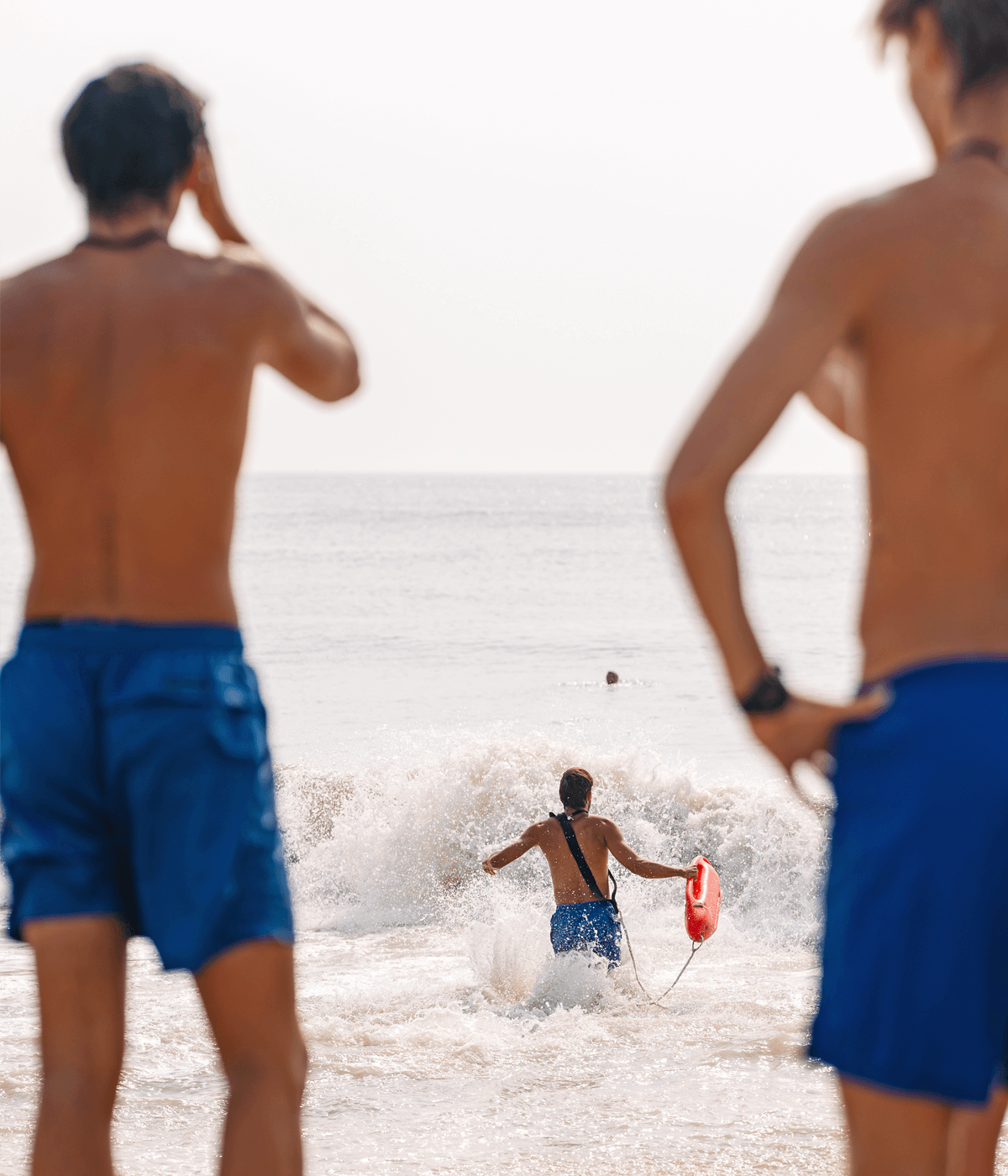They’re our local beach patrols — fixtures of our summertimes for generations and one of the many reasons the Delaware beaches remain family favorites. But it takes more than sharp eyes and tight abs to join their ranks. Read on below for a brief look under the hood of some of our local beach patrols.
REHOBOTH BEACH PATROL
Jeffrey Giles could never stay away from the Delaware waterways. After finishing high school, the Rehoboth Beach teenager applied for a job with the Rehoboth Beach Patrol in 1981.
After enlisting in the state police force, he served on the dive team for 27 years, ultimately running Delaware’s maritime unit. When he retired from the force at 55, he returned to the Beach Patrol as captain, today leading a crew of 52 lifeguards plus a team of officers who protect some 700 daily swimmers at a given time.
“It’s just fun,” Giles says of returning to his roots. “It’s like you’re developing winners. When I hire somebody, I’m like, “This is a winning team, we’re a family, we do this together, we take care of each other.””
But Giles also knows how demanding the job can be — The Rehoboth Beach Patrol made 105 rescues in 2022 and reunited 318 lost children with their caretakers. Guards gave medical care 102 times, including treatment for six spinal injuries.
What does it take to be a good Rehoboth lifeguard? “You have to understand the dynamics of the ocean and how serious the job can be and having the responsibility of taking care of a beach with maybe 700 swimmers in the water on your own is not an easy task,” Giles says. “It takes certain individuals and it’s building these kids up, getting them the tools that they need basically by working them out, understanding the surf and getting them ready.”
The bar to join the Rehoboth Beach Patrol is set high. Giles and his crew screen applicants with rigorous physical and mental tests. Initial testing involves 500-yard swims or following up a 100-yard swim by executing a simulated save to test one’s mettle when tired. The job requires peak physical conditioning so guards can compete with the ocean — so workouts involving running and upper body strength are a must.
But, as Giles says, “the best thing here in Rehoboth is the tradition.” The 102-year-old unit is known throughout town and beyond as much for its beach acumen as its storied lifeguard competitions. The Rookie of the Year competition runs first-year guards through a gauntlet of 10 different events from paddleboard swimming, a mile swim, a sprint run, pushups and something called buoy charges. Giles himself earned Rookie of the Year honors in 1981.
The Rehoboth Beach Patrol Lifeguard Olympics — this year held on July 27 — is a beloved spectacle that pits local beach patrol units against each other in events ranging from six-person tug-of-war to a paddleboard rescue race to the iron man medley of swimming, running and paddling. This event falls during summer season when the crowds are massive, and the competitors are in peak condition.
DEWEY BEACH PATROL
Dewey Beach Patrol lifeguards are so well-trained, they’re almost over-trained, says Captain Todd Fritchman.
When he was a guard for the Rehoboth Beach Patrol in the ‘80s, all he needed was an interest in athletics and an open summer calendar. Today, the patrol he leads is certified as an Advanced Open Water Rescue Lifesaving Association entity by the United States Lifesaving Association. Furthermore, all his lifeguards are certified in open water rescue after 23 days of training and testing. His guards are technically emergency medical responders, certified and trained by the Delaware State Fire School, a 44-hour course held onsite. “We also provide the basic life support for anyone who succumbs to traumatic injury or sickness in the town of Dewey Beach,” he says.
Dewey Beach patrol is the only one of its kind in the state that provides open water rescue in the ocean and the bay. That’s not all they have to prepare for. “We have a municipal beach. We have a hotel/motel beach and we have a marina system that warrants some basic oversight and the ability to emergency respond and regulate all those facilities if and when needed,” Fritchman says.
“There is no other sport that gets you more physically fit than open water rescue training.”
— Todd Fritchman
They support beach events and even host a nighttime youth recreation program on Dagsworthy Street. Fritchman has been leading the paramilitary unit since 1997. While he realizes the challenges are steep, he knows the inherent benefits they impart.
“[The experience] increases a person’s mental and physical wellness,” he says. “Everybody leaves our beach patrol, and I’m sure others, better than when they came in.”
From a physical standpoint, “there is no other sport that gets you more physically fit than open water rescue training because it’s a combination of everything,” Fritchman says. “You’re amphibious. You must be able to swim and run straight. Everything is so dynamic.”
Mentally, a few years’ experience as a Dewey lifeguard is the equivalent of a free postsecondary education, Fritchman says. Many of his guards have gone onto careers in teaching, development and medicine, utilizing the drive, dedication and direction-setting they learned on the Beach Patrol. Like many local patrols, Dewey Beach hosts and provides competition teams at the Sussex County Lifesaving Association Ocean Series and other local, regional and national lifeguard championships.
DELAWARE STATE PARKS BEACH PATROL
Delaware State Parks Beach Patrol Capt. Bailey Noel pushes his guards hard. But, as he says, “We train for the worst day of somebody else’s life.” The 14-year veteran of Delaware beach patrols (from the Town of Fenwick Island as a rookie to North Bethany to Sea Colony before landing with the State Parks last year) clearly knows his stuff. Thanks to his presence as captain plus a strong marketing push, his patrol has grown from 46 guards to 78 in under a year.
The bare minimum to join this patrol’s ranks is a 500-meter swim and a one-mile run in under 10 minutes apiece. Rookies can expect to spend two to three weeks in an intense training camp, “learning anything I know how to do,” Noel says. Earning Emergency Medical Responder certification, mock rescues, ocean knowledge and more are all part of the curriculum. “We often tell people this will either be the hardest thing physically or the hardest thing mentally you’ll ever have to do.”
Once they’re part of the beach patrol family, Noel keeps his guards sharp with daily drills. State Park beach patrol guards are also tasked with passing their knowledge along. A junior guard program for kids aged eight to 16 not only teaches youth about riptides and ocean wildlife, but bolsters the pipeline of future guards.
LEWES BEACH PATROL
The arc on the Delaware Bay that creates Lewes Beach may not get many waves — but swimming can get tricky, and fast. The Lewes Beach Patrol recorded 57 water rescues in 2022, mostly from instances where changing winds overturned rafts or disoriented visitors.
With a relatively new captain in longtime lifeguard and swim instructor Strohm Edwards, in his second season — the Lewes patrol is ramping up its recruitment efforts. Parks and Marina Administrator Janet Reeves said the city used an app called Handshake to recruit from all Delaware colleges and universities. She also reached out to high school guidance counselors. Recruiting efforts have also included online campaigns and job fairs. The city reimburses guards for their certification course, which can exceed $400.
In addition to a souped-up guard shack and pay increases, the Lewes Beach Patrol is looking to bolster its pipeline with a junior lifeguard program.
Think of a buoy charge as a watery version of the dreaded “suicide sprint” drill known to many dry-land sports. Lifeguards start out in the soft sand and sprint into the water, swim out to a certain distance and then back to shore; rinse and repeat. Sometimes pushups are performed between sets, but the lifeguard’s signature red buoy is always carried throughout.
SEE THIS
46th Annual Rehoboth Beach Patrol Lifeguard Olympics
Participants from beach patrol units in Delaware and Maryland will assemble Thursday, July 27 in Rehoboth Beach, to compete in a showcase of pure strength, endurance and mental toughness in an annual event that draws huge crowds. Selected guards from patrols including Rehoboth Beach, Fenwick Island, Bethany Beach, Sea Colony, Delaware Seashore State Park and Ocean City, Maryland, among others, go head-to-head in events like a one-mile beach run, half-mile paddle, surf dash, Iron Man medley, sand sprint relay and tug-of-war, vying for recognition and bragging rights. Collective points yielded for each event will determine this year’s champion.
The competition begins at 5:30 p.m. and continues after dark under lights. Spectators gather at the stretch of beach in front of RBP headquarters at Baltimore Avenue and the Boardwalk.
















